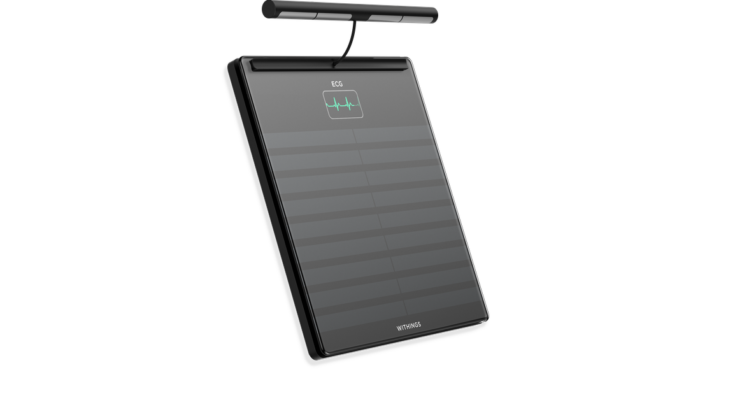Withings isn’t a stranger to smart scales, but for CES 2022 the company is taking a much more ambitious take on the gadget. Announced today, the Withings Body Scan will feature six-lead EKG readings, segmented body composition measurements, and the ability to assess foot nerve activity. Basically, it’s the scale for people who want to know how fat is distributed through their body and how that might in turn relate to their heart health.
On the surface, the Body Scan looks like your typical scale — albeit with a retractable handle up top. It contains four weight sensors and 14 ITO electrodes in the scale itself, plus an additional four located in the handle. The scale also features a larger 3.2-inch LCD color screen, as well as a battery life of one year. It’ll also integrate with Withings’ smartwatches, on top of Apple HealthKit and Google Fit APIs.
While the handle is definitely unique visually, it’s also what enables the Body Scan’s more interesting features. Smart scales measure body composition via bioelectrical impedance analysis (BIA). It works by sending a low-level electrical current through your body. Body fat, water, and lean mass all have different resistance levels, so depending on the rate at which the current travels, the scale will estimate your body composition. However, most scales only have two points of contact: your feet. That means you’re really getting an estimate for your lower body only. Withings says the Body Scan will use “multi-frequency” BIA as the retractable handle provides two extra points of contact, hence, segmented body composition measurements.
Withings claims the Body Scan can differentiate between your torso, your right and left legs, and your right and left arms. The scale will also break down body composition into whole-body fat and water percentages, visceral fat, muscle and bone mass, and extracellular and intracellular water. It’s hard to say how accurate the Body Scan will be — smart scales are notoriously inaccurate — but it’s admittedly nice to see that Withings is attempting to provide extra context. For example, many smart scales don’t differentiate between subcutaneous and visceral fat. While jiggly subcutaneous fat is relatively harmless, invisible visceral fat is the kind that’s actually most dangerous to your health.
Body composition has had a recent resurgence in wearables. Samsung introduced BIA analysis on its Samsung Galaxy Watch 4, while Amazon also introduced a body fat feature on its Halo platform. Each of these companies has emphasized their body fat tools as an alternative to Body Mass Index (BMI), which is a flawed metric for evaluating your overall health. That said, improperly tracking body fat can also act as a potential trigger for body dysmorphia and other eating disorders.
:no_upscale()/cdn.vox-cdn.com/uploads/chorus_asset/file/23128369/2021_11_15_WBS08_CES_PERS34.png)
“We’ve been looking for a way to do this safely and effectively,” Withings chief medical officer Shikha Anand told The Verge. “We can’t solve the way in which the world sees weight, but that said, we will make every effort not to exacerbate it. We will ground in health and not in weight wherever we can. It will always be about how your weight relates to your health.”
Anand went on to explain that weight is often tied to self-esteem, and that’s part of why Withings wants to repackage its scale as a health station. The idea, Anand says, is to show how your weight relates in context to your overall cardiovascular health, as well as offer more holistic, behavioral insights. Anand also emphasized Withings is testing the Body Scan with a diverse cohort of consumers to ensure the body composition feature is more helpful than harmful. She also said the Withings app would be upgraded with better data visualizations for long-term trends.
Aside from body composition, Withings says the Body Scan will provide heart rate, EKG recordings, and vascular age data at each weigh-in. EKG readings can be saved and shared with doctors. Meanwhile, the vascular age feature is meant to show people how their cardiovascular health compares to other people within their age group.
While body composition, and even EKGs, make sense for a scale, Withings is taking it one step further with a new nerve assessment feature developed with French medical device maker Impeto Medical. The scale will purportedly measure sweat gland activity in your feet and generate a score. According to Withings, foot nerve activity is currently under investigational use and could potentially show signs of nerve dysfunction.
This is all well and good, but like Withings’ other recent gadgets, the Body Scan is subject to FDA and CE clearance. So while Withings says it plans to launch the Body Scan for $279 in the second half of 2022, that’ll all depend on how fast the company can get the regulatory go-ahead. The Withing ScanWatch, for instance, was introduced at CES 2020 and only obtained FDA clearance in November 2021. Despite this, Anand says Withings is optimistic it won’t take quite as long this time around.
“We’ve learned a lot with the process of the ScanWatch, and gotten to know the team at the FDA quite a bit better. I feel we’re on the path to have [the Body Scan] on a reasonable time frame.”



